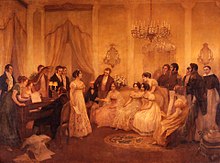আর্জেন্টিনার জাতীয় সঙ্গীত
আর্জেন্টিনার জাতীয় সঙ্গীত (স্পেনীয়: Himno Nacional Argentino) হল আর্জেন্টিনার জাতীয় সঙ্গীত। গানটির আসল নাম ছিল মারচা পাত্রিওতিকা (দেশপ্রেমিক মার্চ) এবং পরবর্তীতে কানসিওন পাত্রিওতিকা ন্যাসিওলান (জাতীয় দেশাত্মবোধক গান) এবং পরিশেষে কানসিওন পাত্রিওতিকা (দেশাত্মবোধক গান) এ নামকরণ করা হয়। ১৮৪৭ সালে একটি অণুলিপি প্রকাশিত যার নাম ছিল হিমনো ন্যাসিওলান আর্জেন্টিনো। গানটি লিখেছেন বুয়েনোস আইরেসে জন্মগ্রহণকারী রাজনীতিবিদ ভিসেন্তে লোপেজ ইয়্য প্লানেস এবং এতে সুর দিয়েছেন স্পেনীয় সুরকার ব্লাস পারেরা।[১] একে মে বিপ্লবের তিন বছর পরে ১১ই মে, ১৮১৩ সালে অফিসিয়াল গান হিসেবে গৃহীত হয়, তাই ১১ই মে হচ্ছে আর্জেন্টিনায় সঙ্গীত দিবস।
| হিমনো ন্যাসিওলান আর্জেন্টিনো | |
|---|---|
| বাংলা: আর্জেন্টিনার জাতীয় সঙ্গীত | |
 আর্জেন্টিনার জাতীয় সঙ্গীত মারিকুইতা সানচেজ এর বাড়িতে প্রথমবার বাজানো হচ্ছে। | |
| কথা | ভিসেন্তে লোপেজ ইয়্য প্লানেস, ১৮১২ |
| সুর | ব্লাস পারেরা, ১৮১৩ |
| গ্রহণের তারিখ | ১৮১৩ |
| সঙ্গীতের নমুনা | |
| | |
গানের কথা সম্পাদনা
আসল সংস্করণ সম্পাদনা
নিম্নলিখিত মারচা পাত্রিওতিকা (১৮১৩)[২] হচ্ছে আসল সংস্করণ:
| গানের কথা স্পেনীয় ভাষায় | ইংরেজি অনুবাদ | বাংলা অনুবাদ |
|---|---|---|
| প্রথম স্তবক | ||
|
¡Oíd, mortales!, el grito sagrado: |
Hear, mortals, the sacred cry: |
. |
| দ্বিতীয় স্তবক | ||
|
De los nuevos campeones los rostros |
From the new Champions their faces |
. |
| তৃতীয় স্তবক | ||
|
Pero sierras y muros se sienten |
Mountain ranges and walls are felt |
. |
| চতুর্থ স্তবক | ||
|
¿No los veis sobre México y Quito |
Don't you see them over Mexico and Quito |
. |
| পঞ্চম স্তবক | ||
|
A vosotros se atreve, argentinos, |
To you it dares, Argentines, |
. |
| ছষ্ঠ স্তবক | ||
|
El valiente argentino a las armas |
The valiant Argentine to arms |
. |
| সপ্তম স্তবক | ||
|
San José, San Lorenzo, Suipacha, |
San José, San Lorenzo, Suipacha, |
. |
| অষ্টম স্তবক | ||
|
La victoria al guerrero argentino |
Victory to the Argentine warrior |
. |
| নবম স্তবক | ||
|
Desde un polo hasta el otro resuena |
From one pole to the other resounds |
. |
| দশম স্তবক | ||
|
Sean eternos los laureles, |
May the laurels be eternal, |
. |
আধুনিক সংস্করণ সম্পাদনা
নিম্নলিখিত সঙ্গীতটি হচ্ছে ১৯২৪ সালে গৃহীত স্পেনের আধুনিক সংস্করণকৃত জাতীয় সঙ্গীত। এটি স্পেনের বিরুদ্ধে প্রাণবন্ত আক্রমণ ছাড়া।
| গানের কথা স্পেনীয় ভাষায় | ইংরেজি অনুবাদ | বাংলা অনুবাদ |
|---|---|---|
| প্রথম স্তবক | ||
|
Oíd, mortales, el grito sagrado: |
Hear, mortals, the sacred cry: |
|
| দ্বিতীয় স্তবক | ||
|
Ya su trono dignísimo abrieron |
For their most honourable throne has opened |
তাদের সম্মানিত সিংহাসন ইতিমধ্যে খোলা হয়েছে দক্ষিণের ইউনাইটেড প্রদেশসমূহ এবং বিশ্বের মুক্ত প্রতিক্রিয়া: "দুর্দান্ত আর্জেন্টিনার মানুষকে, চিয়ার্স!" "দুর্দান্ত আর্জেন্টিনার মানুষকে, চিয়ার্স!" এবং বিশ্বের মুক্ত প্রতিক্রিয়া: "মহান আর্জেন্টিনার জনগণের জন্য, শুভেচ্ছা!" এবং বিশ্বের মুক্ত প্রতিক্রিয়া: "মহান আর্জেন্টিনার জনগণের জন্য, শুভেচ্ছা!" |
| তৃতীয় স্তবক | ||
|
Sean eternos los laureles, |
May the laurels be eternal, |
বিজয়ীরা অনন্ত হোক, যেটা আমরা অর্জন করতে জানতাম, যেটা আমরা অর্জন করতে জানতাম। গৌরবের মুকুট, আমাদের বাঁচতে দিন ... অথবা আমরা গৌরবের সাথে মরার শপথ করি! অথবা আসুন আমরা গৌরবের সাথে মরার শপথ করি! অথবা আসুন আমরা গৌরবের সাথে মরার শপথ করি! |
তথ্যসূত্র সম্পাদনা
- ↑ "Símbolos Nacionales" [National Symbols] (স্পেনীয় ভাষায়)। Presidency of the Argentine Nation। সংগ্রহের তারিখ ২১ নভেম্বর ২০১১।
La necesidad de tener una canción patriótica, que surgió con la Revolución de Mayo y que el Triunvirato supo comprender, se ve plasmada hoy en el Himno Nacional Argentino, con música de Blas Parera, letra de Vicente López y Planes, y arreglo de Juan P. Esnaola.
- ↑ Pereyra, Fernando। "¡Oíd Mortales!..." [Hear mortals!...]। Dr. Jorge Horacio Gentile (Spanish ভাষায়)। ২ ডিসেম্বর ২০১৩ তারিখে মূল থেকে আর্কাইভ করা। সংগ্রহের তারিখ ২১ নভেম্বর ২০১১।
বহিঃসংযোগ সম্পাদনা
- Argentina: Himno Nacional Argentino - Audio of the national anthem of Argentina, with information and lyrics
- Argentine National Anthem MP3
- Argentine National Anthem MP3
- Argentine National Anthem (vocal) MP3
- Argentine National Anthem MP3 ওয়েব্যাক মেশিনে আর্কাইভকৃত ১১ ফেব্রুয়ারি ২০২১ তারিখে
- Argentine National Anthem with English subtitles on YouTube.
- Listen in the Quechua language